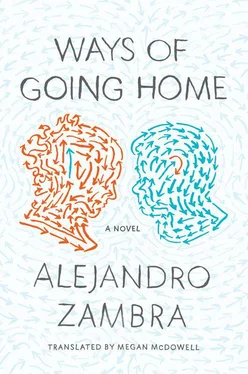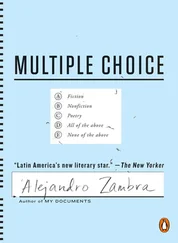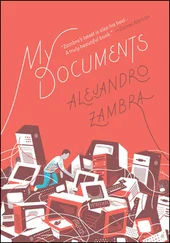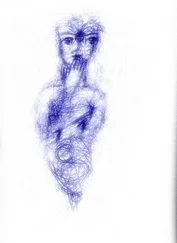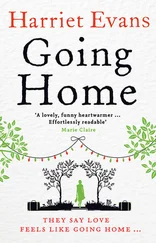I tell her it seems incredible that Ximena threw her out.
“She didn’t throw me out, really,” she answers. “We had a bad argument, but I could have stayed at the house. I wanted to leave, it’s really hard for me to live with her.”
I ask her if Ximena was always like that. She tells me no, that their father’s illness changed her. That in his last years she gave up everything to take care of him. “Now that my father is gone she doesn’t know what to do, she doesn’t know how to live. But I guess it’s more complicated than that,” says Claudia, and she stares fixedly at the lamp in the living room, as if following the movement of a moth.
I ask her why she went to the United States. “I don’t know,” she answers. “I wanted to go, I wanted to leave. My father wanted me to go too, he was already sick by then, but he wanted me to go,” says Claudia, taking on a confessional tone again. “He supported me, above all, during Ximena’s attacks. But Ximena wanted me to go, too. In some way she fantasized about that ending: her taking care of my father to the end and me rushing back, full of guilt, for his funeral.
“I don’t know when, years ago,” Claudia adds, “Ximena constructed the story that I was the evil sister who wanted to take everything from her. And maybe it’s too late to make peace now. Because Ximena is right, in a way. She stayed because she wanted to stay. But she stayed,” says Claudia. “In some way my father had to choose which of his daughters’ lives to fuck over. And he chose her. And I was saved.”
I ask her if she is really full of guilt.
“I don’t feel guilty,” she answers. “But I feel that lack of guilt as if it were guilt.”
“Are you going to go back to the States?”
Two weeks earlier, the afternoon of our reencounter, Claudia told me she had completed a master’s in environmental law in Vermont, and she would rather look for work there, and that she had been living with an Argentine boyfriend for a long time. But now she pauses before answering.
“Sometimes I doubt it,” she says finally. “Sometimes I think I should come back to Chile for good,” she says. It seems to me that she doesn’t know why she says it. I don’t believe her. I don’t think Claudia is seriously considering the possibility of staying. I think Claudia is simply looking for something, and as soon as she finds it she will go back to the United States.
She looks tired and relieved at the same time. And she is a bit drunk. As we have sex she smiles, showing her teeth a little bit. It’s a beautiful and strange gesture. I think I will remember it. That I will miss it.
We sleep little, only two or three hours. Then the noise of cars, of voices, starts up. People leave for work, for school. We make orange juice, and while we eat breakfast she looks at her e-mail on my computer. She finds a message from Ximena. I’m not going to sell the house, don’t incist , it says, and Claudia can’t believe it: “It says incist, with c , really.” For a millisecond she thinks it’s terrible that Ximena would make that kind of mistake and right away she is ashamed, because it’s even worse that, under the circumstances, she would care about something so stupid as a spelling mistake.
The house is not for sale , Ximena continues. It’s my house now. Now more than ever , she says.
I’m not going to insist, thinks Claudia: it doesn’t make sense. Deep down she understands why Ximena is attached to the house, though she thinks it would be better to sell it and split the money. She thinks that being so close to the past isn’t good for anyone. That the past never stops hurting, but we can help it by finding a different place.
“But maybe it’s too soon to talk about pain,” she says to me while I look at the traces of wine on her lips. Suddenly she seems very young to me: twenty-five, twenty-six, definitely no more than thirty.
I go to the university, teach a not-so-good class, go home. I had imagined the scene, but it still surprises me to open the door and see Claudia stretched out in the easy chair. “Your beauty does me good,” I say to her, without thinking about it much. She looks at me cautiously and then lets out a guffaw, but she comes over, puts her arms around me, and we end up screwing standing up in a corner of the kitchen.
Afterward, we make noodles and put together a sauce with a little cream and some scallions. The sauce turns out a bit dry and the truth is neither one of us is hungry.
“Sometimes, when I look at the food on my plate,” says Claudia, “I remember that expression, the answer my mother and grandmother would always give me: Shut up and eat.” They’d made something new, some unfamiliar stew that didn’t look good, and Claudia wanted to know what it was. Her mother and grandmother would answer in unison: Shut up and eat.
It was a joke, of course, a wise one, even. But that’s how Claudia felt as a child: that strange things were happening and they were living with the pain, they struggled with a long and imprecise sadness, and nonetheless it was better not to ask questions. To ask was risking that they would answer the same way: Shut up and eat.
Later the time for questions came. The decade of the nineties was the time of questions, in her opinion, and right away she says, “I’m sorry, I don’t want to sound like those quack sociologists you see on TV, but that’s how those years were: I sat down and talked to my parents for hours, asked them for details, I made them remember, and I repeated those memories as if they were my own.” In some terrible, secret way she was seeking her place in their story.
“We didn’t ask in order to know,” Claudia says to me as we collect the plates and clear the table: “We asked in order to fill an emptiness.”
“Sometimes Ximena reminds me of my mother,” says Claudia over cups of tea. “It’s not a physical resemblance, really. It’s her voice, the tone of her voice,” she says.
She thinks about those moments when her mother had no other recourse but to talk. She called the girls to her, she took her time over her words, as if tuning in little by little to a sweet, calm tone — a careful tone, artificial. Then, as if conducting a ceremony, she spoke clearly. She modulated. She met their eyes.
One afternoon in 1984 she spoke to them separately. First she called Ximena into the kitchen and closed the door. It was strange for the conversation to take place in the kitchen. She had asked her mother about it shortly before her death. “Why did you want to talk to us in the kitchen that afternoon?”
“I don’t know,” said her mother. “Maybe because I was nervous.”
The conversation with Ximena didn’t last long. She quickly reemerged and ran outside, and Claudia couldn’t see her face. In light of the circumstances, the five-year difference between the sisters became an insurmountable distance. Ximena was argumentative and irascible, but in the end she was always on the adults’ side, while Claudia only understood things halfway.
“Then it was my turn,” says Claudia, and she pauses in a way that seems dramatic. I think she’s about to break down, but no, she just needed that pause. “I don’t remember her words very well,” she continues. “I guess she told me the truth, or something like the truth. I understood that there were good people and bad people, and we were good people. That good people were sometimes persecuted for thinking differently. For their ideas. I don’t even know if I knew what an idea was back then, but in some way, that afternoon I found out.”
Her mother talked to her in a soft, generous intonation: For a while you can’t call your father Dad. He’s going to cut his hair like your uncle Raúl’s, he’s going to shave his beard so he’ll look a little more like your uncle Raúl. Claudia didn’t understand, but she knew she had to understand. She knew that everyone else, including her sister, understood more than she did. And it hurt her to have to accept that. She asked her mother how long she would have to stop calling her father Dad. “I don’t know. Maybe a short time. Maybe a long time. But I promise you that you’re going to be able to call him Dad again.”
Читать дальше
